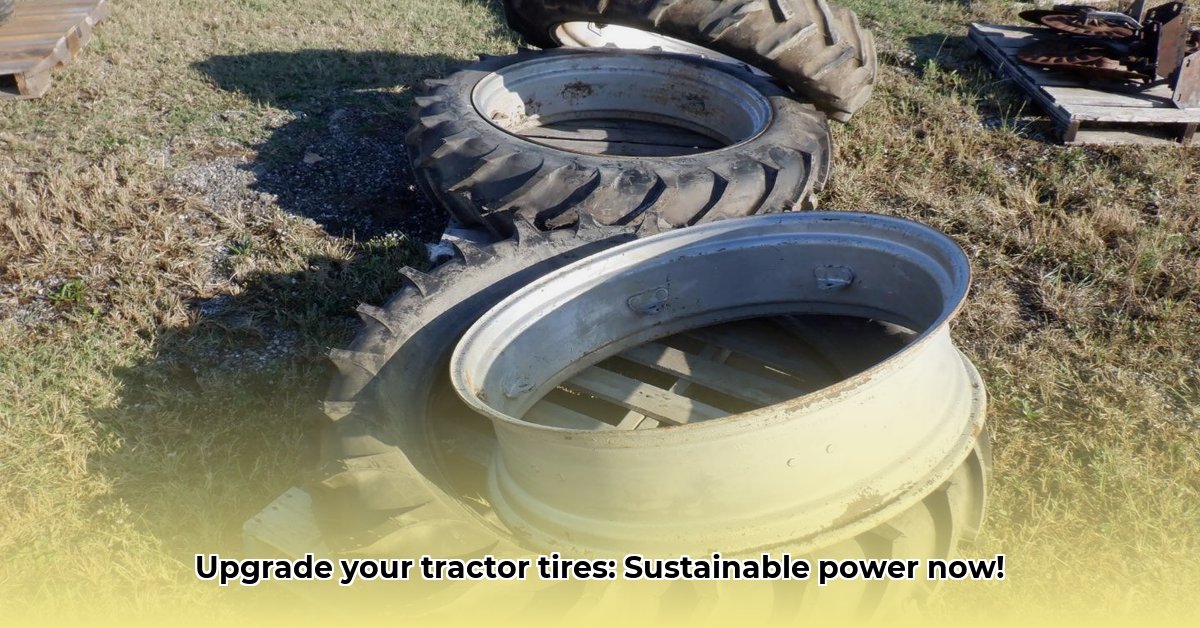
Maintaining a classic tractor is a labor of love, and choosing the right tires is paramount. Finding sustainable and durable 11.2-36 tractor tires presents unique challenges, balancing performance with environmental responsibility. This guide provides actionable steps for antique tractor owners, manufacturers, and policymakers to create a more sustainable future for this niche market. For more information on similar tire sizes, check out this helpful resource on other tractor tire sizes.
Understanding Your 11.2-36 Tractor Tire
The 11.2-36 tire, often seen on older tractors, is typically a robust design, with brands like Titan R-1 being common choices. Many are "tube-type" tires (meaning they have an inner tube), offering some advantages in terms of repair but increasing the risk of punctures. Proper inflation (check the sidewall for recommended pressure) is crucial for optimal performance and longevity. Ignoring this simple step can lead to faster wear and tear, impacting both fuel efficiency and the overall lifespan of the tire. But how much does tire pressure truly affect that lifespan? Studies show correct inflation increases lifespan by up to 20%.
The Environmental Impact: Beyond the Rubber
Traditional tractor tire production is energy-intensive and relies on non-renewable resources. Manufacturing processes generate significant emissions and waste. Even worse, disposal presents a major environmental challenge, with many tires ending up in landfills. The lack of readily available data specifically on 11.2-36 tire environmental impact underscores the urgent need for more research. How can we accurately assess the full lifecycle environmental cost of these specialized tires? Gathering this data is crucial for developing effective sustainability strategies.
Finding Sustainable Alternatives: Practical Steps
Extending the lifespan of your 11.2-36 tires and reducing environmental impact is achieved through several strategies.
1. Retreading: A Cost-Effective Solution: Retreading involves removing the worn tread and applying a new layer, extending the tire's usable life significantly. This reduces waste and saves money. However, retreaded tires might not perform as well as new ones and may have a shorter lifespan. It's an excellent compromise for those seeking a balance between cost savings and environmental responsibility.
2. Exploring Alternative Materials: A Look Towards the Future: Research into bio-based rubber (derived from plants) and recycled rubber compounds offers promising avenues for more sustainable tire production. While not yet widely available for 11.2-36 tires, these alternatives represent a significant step toward a greener future for the agricultural sector.
3. Proper Tire Maintenance: Simple Steps for Long-Lasting Tires: Simple maintenance can make a world of difference.
- Regular Inspections: Look for cuts, bulges, or embedded objects.
- Correct Inflation: Maintain the recommended tire pressure to prevent uneven wear and maximize lifespan.
- Careful Driving: Avoid harsh braking, sharp turns, and impacts that can damage your tires.
4. Responsible Disposal: The Final Step: When your tires reach the end of their life, proper disposal is key. Locate and utilize authorized tire recycling centers to prevent them from ending up in landfills. Many communities have programs that accept old tires for proper recycling.
Actionable Steps for Stakeholders
Addressing the sustainability of 11.2-36 tires requires a collaborative effort across the industry.
- Antique Tractor Owners: Prioritize regular maintenance, explore retreading options, and support responsible recycling programs.
- Tire Manufacturers: Invest in research and development of bio-based and recycled rubber. Improve recycling infrastructure to ensure easier disposal for consumers.
- Governments/NGOs: Fund research into sustainable tire materials and disposal methods. Promote initiatives that increase public awareness of the tire recycling process and encourage participation.
Conclusion: A Sustainable Future for Classic Tractors
The pursuit of sustainable solutions for 11.2-36 tractor tires requires a collective effort. By embracing responsible practices, from proper maintenance and retreading to supporting research and advocating for better recycling infrastructure, we can ensure that the love of classic tractors doesn't come at the expense of the environment. The future of antique tractor maintenance depends on a sustainable approach, a future we can all help build.